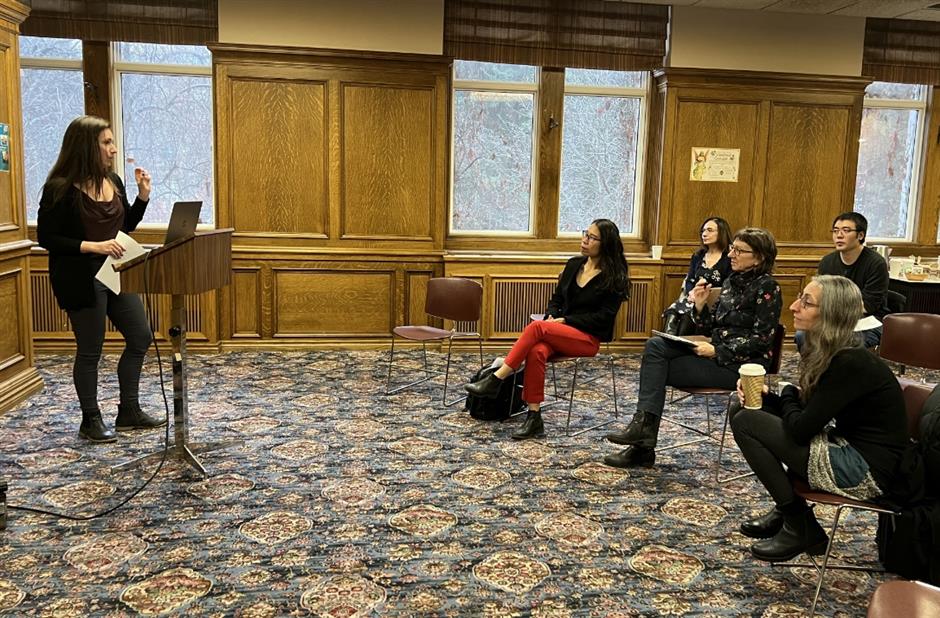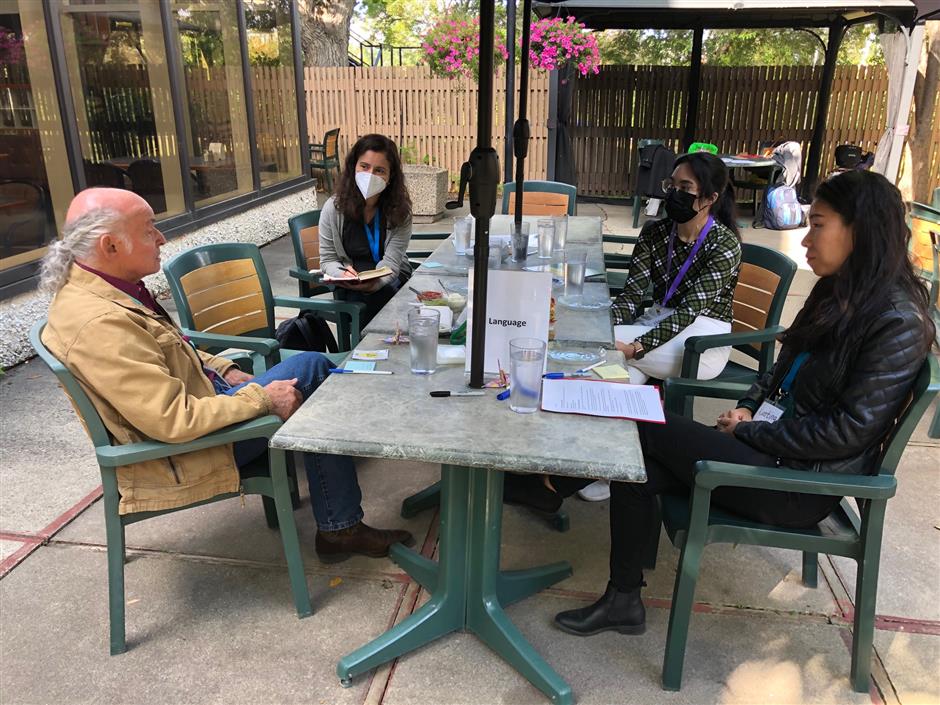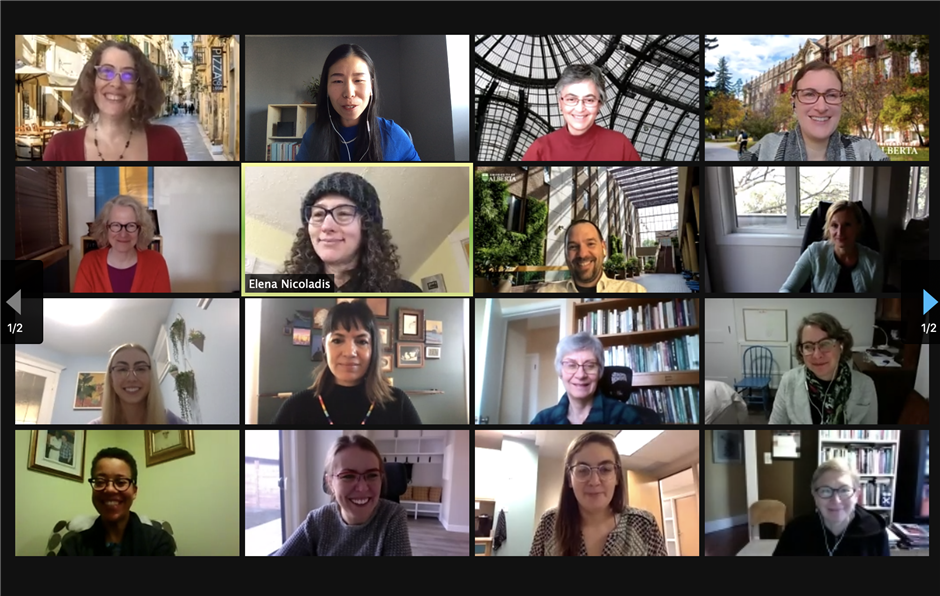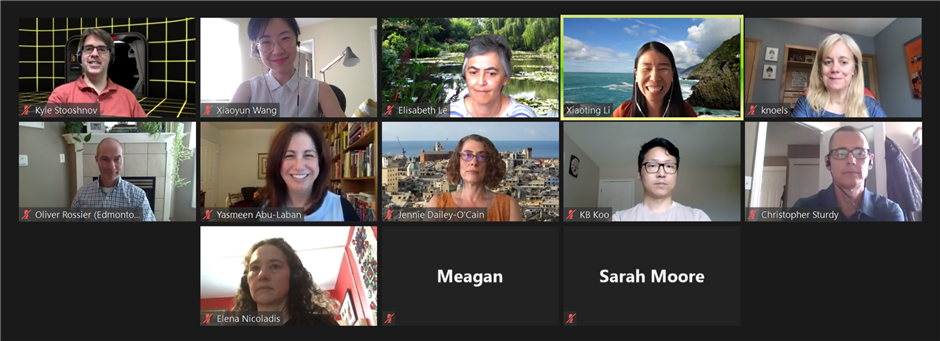Upcoming Events:
-------------
-------------
Past Events:
The Research Method Café by LCC
November 24, 2023
On November 22, 2023, the Faculty of Arts Language, Culture, and Communication Signature Area hosted the Research Method Café, an opportunity for researchers to get to know each others’ research methods and data sources.
Five speakers introduced their research topics and methods. Dr. Sara Dorow from Sociology presented her research on “Communicating the ‘Meaning of Work’ in Image, Word, and Sound,” aiming to develop an inclusive multi-media collection showcasing the work-lives of over 100 Canadian workers. This project collects portraits, written work-life stories, and audio recordings of “the sound of work.” Dr. Yelena Gluzman in Art and Design/Media and Technology Studies introduced “Refractive methods,” focusing on a research-creation approach to the creation of knowledge. Her work explores the understanding of collective knowledge creation processes and materializing ways of knowing. Dr. Helen Vallianatos’s Qualitative Research Methods involve ethnographic approaches and visual methods. She emphasized on the importance of a biocultural approach and the value of embodied knowledge and advocated for diverse methods in knowledge creation. Dr. Ke Wang from Accounting and Business Analytics discussed “Computerized Textual Analysis in Empirical Accounting Research.” He described how automated data collection can significantly reduce data collection costs. Dr. Michelle Maroto of Sociology shared insights on “The Complexities of Mixed Methods Research for the Great Canadian Class Study.” The mixed-methods involve interviews, focus groups, and surveys to explore perceptions of social class.
The event showcased diverse research methods and data used by researchers in the fields of social sciences, humanities and art and provided participants opportunities to carry out in-depth discussions about the synergies of the different research methods and possible collaborations.
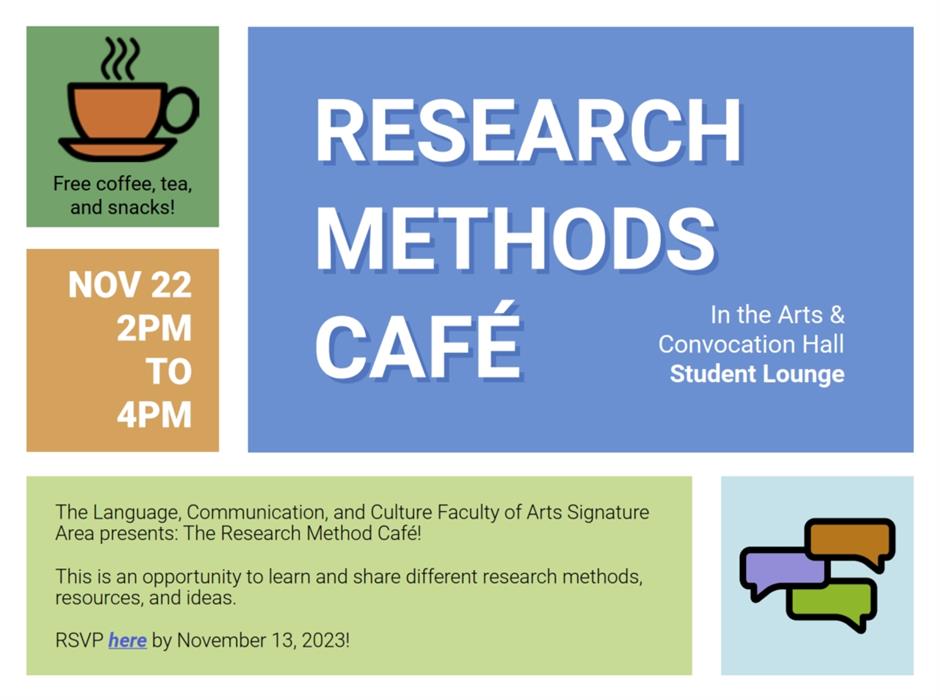
Research Match-Making Event
September 20, 2022
On September 20, 2022, the Faculty of Arts Language, Communication, and Culture (LCC) Signature Area organized a Research Match-Making event in the University Club. This event aimed to provide participants with a space and opportunity to explore future research ideas and collaborations. 14 participants from 5 Departments across 3 Faculties at the University of Alberta participated in the event.
Through three roundtable discussions focusing on “language”, “culture”, and “communication”, participants shared with each other their research backgrounds, current projects, and interested future projects. Their research interests included media and discourse during war time, talk and public decision-making, language and transportation and landscape, etc. The discussions have helped participants identify common research interests and potential future collaborations.
-------------
LCC Grad Network presents..."Overthinking It: Grad Life Q&A"
The Language Communication and Culture Grad Student Network brings together students across the University of Alberta to share in their passion for linguistics, languages, and all the ways that communication enriches our cultures.
We invite you to join us at 12pm MDT on Wednesday, September 21st, for our monthly discussion series Overthinking It: Grad Life Q & A. In these events, we chat informally about topics that are on our minds as grad students.
Our topic for September is “What we wish we knew when we started grad school.” We’ll discuss:
- Why it might take longer to finish than you expect
- Who’s in your corner?
- Questions you’ll get sick of answering...
...and much more!
-------------
Research Tools Workshop Series (Apr.28, May.5, May.20)
May 20, 2022
The Faculty of Arts Language, Communication and Culture (LCC) Signature Area is hosting a series of research tools workshops:
- Statistical Analysis Tools: Testing Mediation and Moderation in R (1-5pm, April 28, 2022)
- Text Analysis Tools (10am-12pm, May 5, 2022)
- Qualitative Video Annotation Tools: ELAN (9-10:30am, May 20, 2022)
Registration:
link to the Google registration form: https://forms.gle/V1ubg3Q3y3YTbcNp7
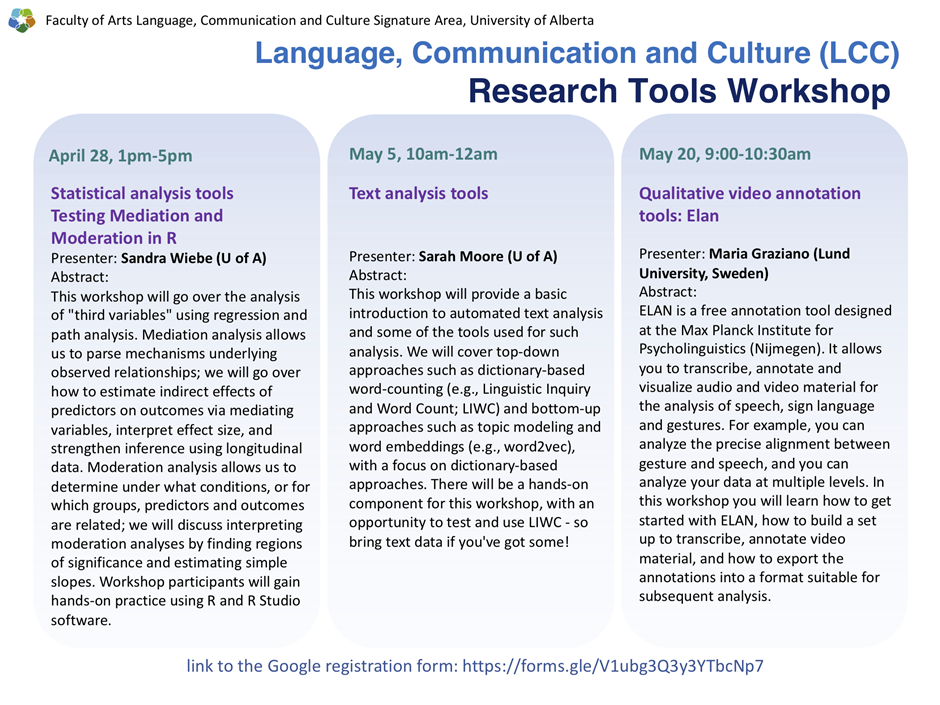
-------------
Research Tools Workshop Series (Apr.28, May.5, May.20)
-
Statistical Analysis Tools: Testing Mediation and Moderation in R (1-5pm, April 28, 2022)
Click the link below to view Dr. Wiebe's PowerPoint slides for the workshop:
Dr. Wiebe's PowerPoint slides for the workshop
-
Text Analysis Tools (10am-12pm, May 5, 2022)
Click the link below to view Dr. Moore's PowerPoint slides and shared readings for the workshop:
Dr. Moore's PowerPoint slides and recommended literature
- Qualitative Video Annotation Tools: ELAN (9-10:30am, May 20, 2022)
-------------
Language, Communication, and Culture Lightning Talks
October 29, 2020
On October 29, 2020, 35 researchers across five Faculties at the University of Alberta participated in the Language, Communication, and Culture (LCC) Lightning Talks Zoom event. Ten researchers from five Faculties—Faculty of Arts, Faculty of Science, Faculty of Rehabilitation Medicine, School of Business, and Faculty of Agricultural, Life, and Environmental Science—presented their research related to Language, Communication, and Culture. They were (following the order of their presentations):
- Jorge Rosés Labrada, Linguistics, “Building multi-purpose language documentation corpora”
- Lana Whiskeyjack, Women’s and Gender Studies, “Connecting to the Spirit of the Language (nêhiyawêwin)”
- Andrea MacLeod, Communication Sciences & Disorders, “Supporting Dual-Language Development in Preschool”
- Jennifer Dailey-O'Cain, Modern Languages and Cultural Studies, “Ideologies of English in the linguistic landscapes of two German cities”
- Alla Nedashkivska, Modern Languages and Cultural Studies, “Language Ideologies in Ukraine in a Time of War”
- Elisabeth Le, Modern Languages and Cultural Studies, “What is ‘Europe’?”
- Sarah Moore, Marketing, Business Economics & Law, “Words in the Marketplace”
- Elena Nicoladis, Psychology, “Using analogies to teach about abstract concepts”
- Arlene Oak, Human Ecology, “What can talk tell us about design? Exploring conversation to understand creative practice”
- Xiaoting Li, East Asian Studies, “Language and body in multimodal Chinese interaction”
Their research involves a variety of topics, such as language documentation corpora, connecting to the Spirit of indigenous languages, language ideologies, words in the marketplace, etc. During the Q-A session, participants raised questions about the presentations which created in-depth discussions on topics of common interest, such as the uses of swear words and pronouns in marketplace and social media, and the use of language and gesture in video-recorded communication. A group of researchers interested in gesture and language in interactions involving decision-making were connected during the Q-A session after the presentations.
Suggestions for future events organized by LCC signature area were also solicited. Two interrelated suggestions were made by a participant. First, LCC could raise its public profile by more actively publicizing its research and its relevance to prominent social issues. In addition, LCC could raise the public awareness of the significance and relevance of the research on language, communication, and culture especially in the current social context. Second, LCC could identify a few larger research themes or research questions as a response to the current social issues. A large group of researchers from different fields across campus who are interested in the themes may collaborate to address those questions. A few suggestions proposed at the meeting were: language discrimination, language marginalization, language and identity of socially underprivileged groups. If you are interested in addressing any of the questions, or if you have any suggestions about other possible research themes, please send your interest and thoughts to langcc@ualberta.ca
Conversations on COVID-19: A VIRtual Exchange of Stimulating Studies (VIRESS)
June 23, 2020
On the afternoon of June 23, 2020, LCC organized a virtual event, Conversations on COVID-19: A VIRtual Exchange of Stimulating Studies (VIRESS). The event provided an opportunity to discuss research ideas about the role of language, communication, and culture in the COVID-19 pandemic from interpersonal, intercultural, and organizational perspectives. Twelve participants from 10 departments across 5 faculties at the University of Alberta presented their research projects and new ideas and took part in small group discussions.
Central themes and questions included: social and cultural influences on behaviors, changes in human language use and communicative strategies; impacts of COVID-19 and how they reflect on government policies, animal behaviors in reaction to lessened human activity, and communicative and learning technologies.
In addition, because the research projects that were shared involved various research methodologies and data collection types, connections between researchers with different backgrounds had the opportunity to form, possibly leading to collaboration between people with different expertise.
Moreover, the discussion raised both academic and practical questions. In terms of academic questions, some researchers discussed how to analyze, document, identify, or describe culturally laden behaviors, actions, and language uses from diverse disciplinary perspectives. Practical research questions concerned how researchers could assist parents in dealing with the issue of children’s increased screen-time as a result of home learning; how app developers could help users understand contact tracking apps; and what kind of support researchers could provide for families that encounter sadness and anxiety as a result of the pandemic.
These discussions reflect the urgent actions that behavioral and social scientists have taken and could further take to understand the COVID-19 pandemic from a language, culture and communication perspective. Such a perspective could not only mitigate COVID-19 pandemic’s negative impacts, but also identify the opportunities for positive social and cultural change that the pandemic offers.
New Data Sessions: Trelani and Xiaoting’s Collaboration Story
March 3, 2020
A new collaboration between researchers in Speech Pathology (Faculty of Rehab Medicine) and International Linguistics (Faculty of Arts)
Our LCC community has developed new data sessions! How did this come about? Take a minute to read about Trelani and Xiaoting’s collaboration story.
Trelani and Xiaoting first met at the round-table discussion held during LCC’s launching event on January 24, 2020. After introducing their current projects, they realized that they shared an overlapping research interest: the interaction between parents and children. As colleagues bonding over shared research interests, Trelani and Xiaoting and their teams decided to have data sessions focusing on the video recordings of parent-child interactions. Since February, 2020, they have successfully run two data sessions in Trelani’s lab examining the verbal and nonverbal behaviors of parent-child interactions in shared book readings.
In the most recent session on March 2, Trelani, Xiaoting, and two graduate students discussed the data together. During the 2-hour session, they watched excerpts of the video recordings of parent-child shared booking reading and recounting a past event. They discussed how parents obtain and maintain children’s attention during activities, how the topics of interaction shift, and how parents employ various linguistic and non-linguistic resources to co-construct activities. Everyone contributed valuable insights regarding the data. We are delighted that the LCC network is able to build bridges between researchers from different fields and Faculties, and to facilitate the creation of new research and collaboration.
LCC Signature Area Launching Event: Roundtable Discussion
January 24, 2020
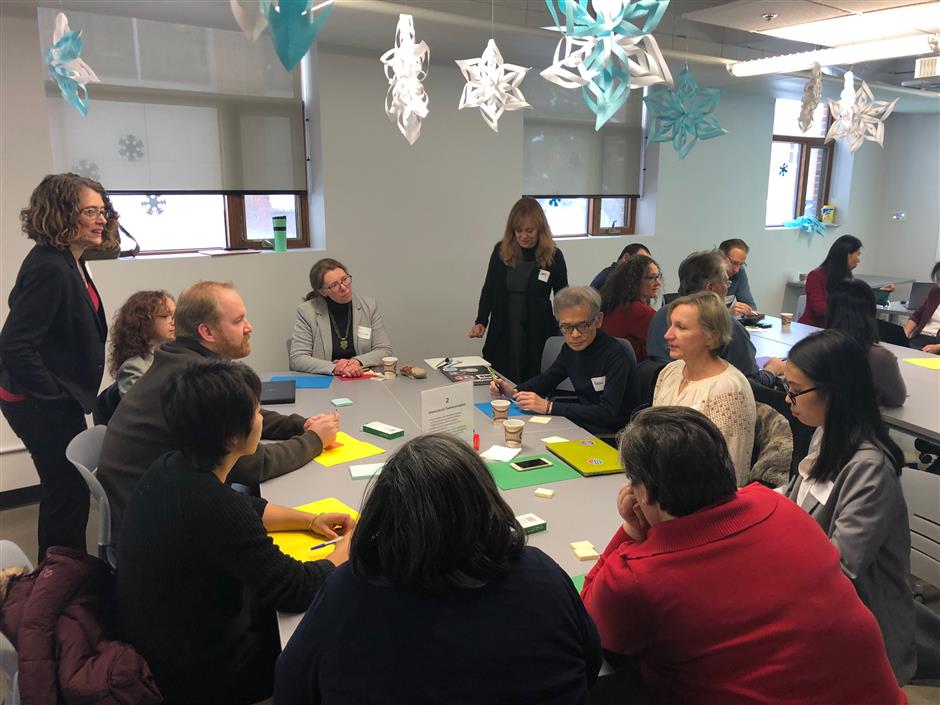
On January 24, 2020, the Language, Communication, and Culture (LCC) Signature Area Network held its launching event, a roundtable discussion. The Roundtable focused on networking, sharing research ideas, and communicating possible future events. Twenty-eight researchers from 10 departments attended the event.
During the event, the leadership team members introduced the three themes of LCC: interpersonal communication, intercultural communication, and organizational communication. It was followed by a roundtable discussion to explore how the research interests of participants relate to those three themes. Under the theme of interpersonal communication, researchers exchanged their ideas with regards to language choice, ideology and identity displaying along with communication, multimodality and non-verbal communication, and the use of language in everyday conversation. The discussion related to intercultural communication brought up the following key ideas: inter- and cross-cultural similarities and differences, using and learning a second language, acquiring a culture in a new environment, and how a new culture influences newcomers’ identity. With regards to organizational communication, researchers discussed the identity/identities of organizations, organization as a facilitator of culture, and how language is used between different levels of an organization.
In addition to sharing their research interests, participants also suggested several possible future events that LCC could organize, including but not limited to research method workshops, research presentations, and networking events. Based on the suggestions, LCC has decided to organize a networking event for Bilingualism and Multilingualism on April 14 2020 and a Graduate Workshop on research methodologies and tools in late-April.
